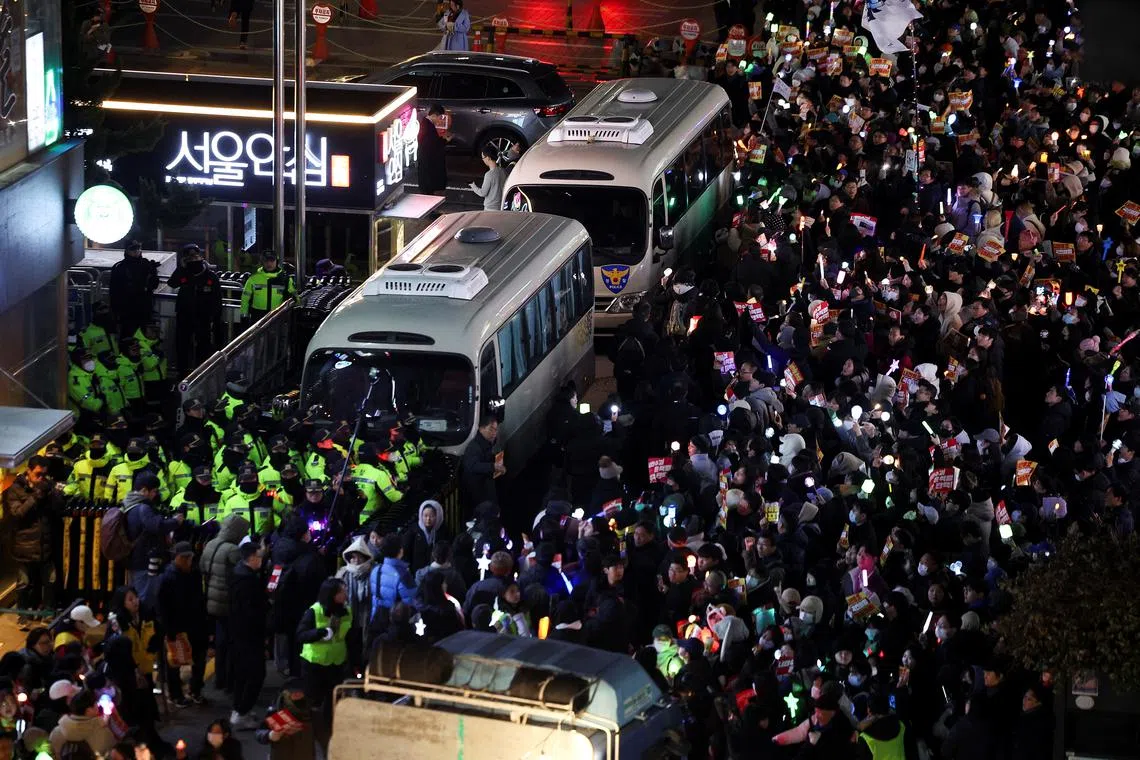South Korea police chief arrested as Yoon impeachment looms over failed martial law
Sign up now: Get insights on Asia's fast-moving developments

Protesters attending a rally in front of the headquarters of the ruling People Power Party in Seoul on Dec 10 to call for the impeachment of the South Korean President.
PHOTO: REUTERS
SEOUL – South Korea’s police chief became the latest top official to be arrested, Yonhap news agency said on Dec 11, in a widening investigation into President Yoon Suk Yeol’s failed martial law
The main opposition Democratic Party (DP) said on Dec 11 it plans to hold a Parliament vote to impeach Mr Yoon on Dec 14, with some members of his People Power Party (PPP) having spoken out in favour of such a motion.
“The impeachment train has left the platform. There is going to be no way to stop it,” DP leader Lee Jae-myung said at the start of a party meeting.
The first impeachment vote on Dec 7 failed as most PPP members boycotted the session.
Mr Yoon’s surprise martial law declaration stunned the country and plunged Asia’s fourth-largest economy and a major US ally into a leadership crisis, sending shockwaves through diplomatic and economic fronts.
National Police Commissioner Cho Ji-ho was arrested early on Dec 11 on insurrection charges, Yonhap said. Cho is accused of deploying the police to block lawmakers from entering Parliament after Mr Yoon declared martial law on Dec 3.
Soon after Mr Yoon’s surprise late-night declaration, lawmakers including some members of his own party defied the security cordon around Parliament and voted to demand that the South Korean President should immediately rescind martial law, which he did hours later.
Mr Yoon himself is now the subject of criminal investigation on insurrection charges but he has not been arrested or questioned by the authorities.
He has apologised but has not responded to growing calls for him to step down, even from some members of his own party.
After appearing on live television on Dec 7 to apologise, Mr Yoon has not been seen in public. PPP leader Han Dong-hoon said South Korean Prime Minister Han Duck-soo would manage state affairs while the party looks for an “orderly” way for Mr Yoon to resign.
The constitutional legitimacy of that has been questioned by opposition parties and some legal scholars.
Mr Yoon’s office said on Dec 10 it had “no official position” when asked who was running the country.
Lieutenant-General Kwak Jong-geun, the commander of the Army Special Warfare Command, told a Parliament committee on Dec 10 that Mr Yoon had ordered him to send his troops to Parliament on Dec 3, “break the door down” and “drag out” lawmakers.
Mr Yoon’s then defence minister Kim Yong-hyun has also been accused by military officers of issuing the same order. Kim has resigned and has been arrested.
Parliament is scheduled to hold a session on Dec 11 to introduce a Bill to impeach Mr Yoon. A two-thirds majority of the opposition-controlled unicameral assembly is needed to pass the Bill. The Constitutional Court then deliberates the case and decides whether to remove the South Korean President from office.
The country’s metal workers’ union, including workers at the Kia automakers, has declared a protest strike for Dec 11. Members of financial institutions including the Bank of Korea plan to join a protest rally on Dec 11. REUTERS


